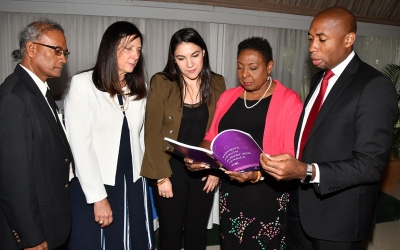The findings show that one in every four women in Jamaica between the ages of 15 and 64 years, will experience violence by their intimate partner and/or some kind of sexual violence in their lifetime.
Minister Grange said that the anecdotal evidence has always suggested that Jamaica had a serious problem with gender-based violence, but the findings of the survey which are based on interviews with women across Jamaica have given “insight as we’ve never had before about the extent of the problem.”The Gender Affairs Minister called for more responsibility to end gender-based violence and she called on men, especially, to become involved in ending relationship violence.
“We are putting emphasis on men, because they are the main perpetrators of the violence. We need to get them to stop! And men have a unique power to influence their brother, their friend, their colleague, their brethren to change violent behaviours and protect women and girls everywhere.”
Minister Grange condemned the “culture of silence” in Jamaica regarding gender violence. According to her, “men who sexually assault or batter women rely on the rest of us to stay silent and do nothing; and in Jamaica we have been providing them with a strong guarantee of silence. They want us to say ‘cockroach nuh bizniz inna fowl fight’. They want us to believe that it’s none of our business. But the truth is, it is the business of all of us who care about women, girls, men, boys and creating a country of peace and harmony.”
The survey also found that the majority of women who suffer relationship violence (81.6%) did not seek professional help unless the cases are severe and preferred, instead to report the violence to a friend, family member and/or a neighbour.
Minister Grange said the findings would prove useful in the development of social policy and would bolster the government’s plan – the National Strategic Action Plan to Eliminate Gender-based Violence in Jamaica. The ten-year plan which came into effect in 2017 outlines actions to prevent gender violence, improve services for victims and improve the implementation of laws to deal with perpetrators.
The survey which was dubbed, the Women’s Health Survey to prevent anyone from hijacking or interfering with the process of collecting the data, was done in partnership with the Statistical Institute of Jamaica, Inter-American Development Bank and the United Nations Entity for Gender Equality and the Empowerment of Women.
Gender-based violence includes: sexual assault, domestic violence, relationship abuse, sexual harassment, human trafficking and sexual abuse of children.
-END-
 Government of Jamaica
Government of Jamaica
